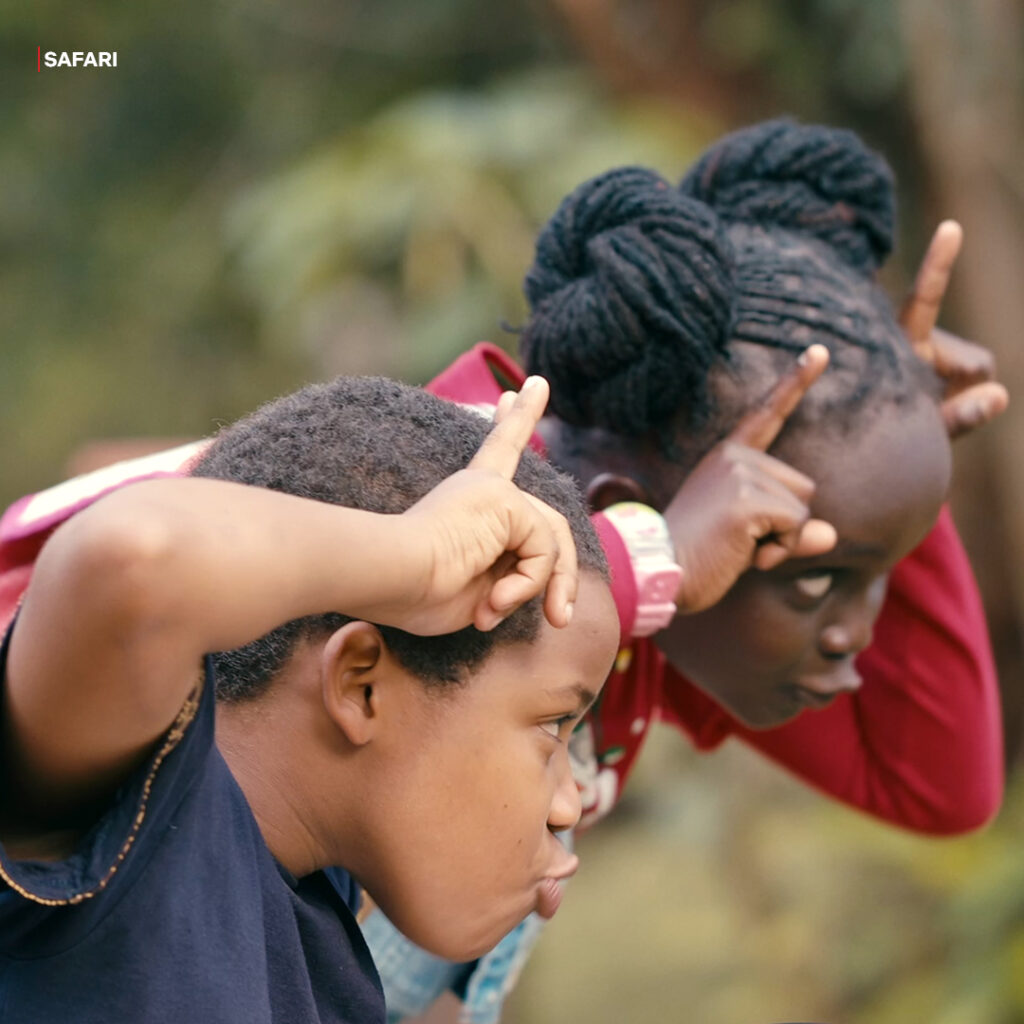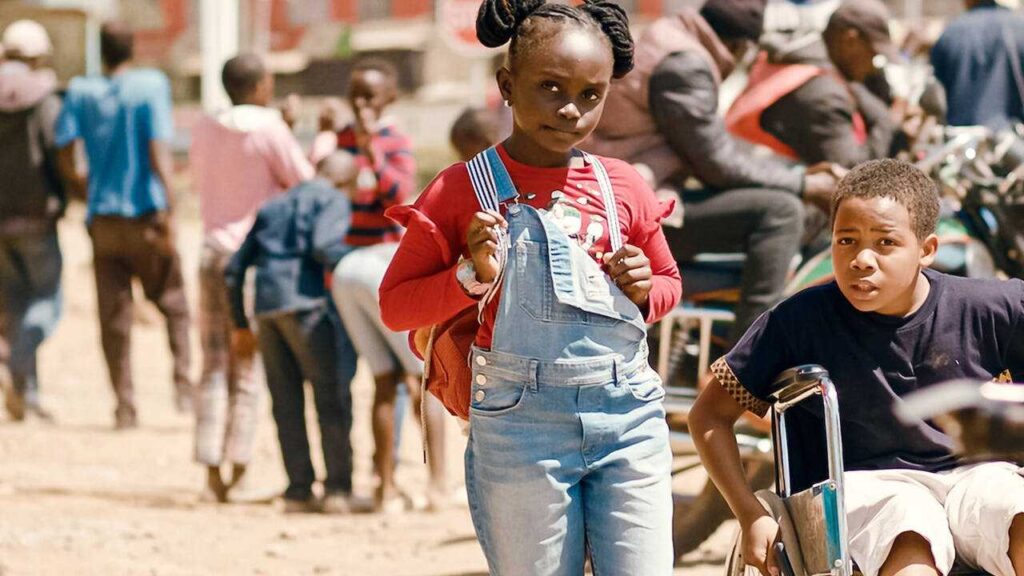Kiki and Safari’s admirable acting hints at their comfortability and familiarity with the requirements of show-biz. It suffices to say this: the child actors’ performance is the best offering of Safari…
By Seyi Lasisi
I easily recall two films while watching and reflecting on Bill Afwani-directed Safari: Idris Elba-led Beast of No Nation, and Salvador Calvo-directed Adu. Both films introduced me to the potential ability of child actors when cast in a project. In the war-focused Beast of No Nation, Agu (played by Abraham Attah) morphs from an innocent and naive child into a child soldier. As Agu reluctantly transits into a soldier, his countenance, body movement, and utterances hint at the depth of his range as a budding actor. In the eponymous Adu, a four-year-old Moustapha Oumarou witnesses the complexities and tragedy of migration. Oumarou’s face, rather than his spoken words, captures his ability to act with conviction. In Safari, written also by Bill Afwani, two child actors, Kiki and the titular Safari, are present. These two child actors, once again, stand as a reminder of the importance of casting child actors. They are the future of African cinema.
The film spotlights the life of Safari (Victor Fadhili), a child confined to a room because of the paralysis of his legs. Safari’s permanent confinement to his room is a decision taken by his aunty (Janet Mbhungo). Safari, as his name implies, seems to be a natural traveller. Through his exposure to documentaries about wildlife, he satiates his appetite for exploration. Pictures of his favourite landscapes and animals are pasted on the wall of his room. Though his room is filled with a pictorial itinerary, he lacks the physical experience of visiting his favourite places and seeing his most cherished animal, the elephant. There comes Kiki (Abilasha Muthoni) whose presence is an answer to his prayer. By breaking Safari from his lock, she gives him the pleasure of visiting interesting places that catch his fancy. It’s through this visit that he meets other cast members that hold importance to the film’s plot: Ranger Zainab (Zeinab Ali), and Foreigner (Mehul Savani.) Their presence will cause a drastic detour for the film.
(Read also: Here Love Lies Review: The Appealing Aura of Tope Oshin’s Film is Stifled by a Puzzling Plot)
With the representation of physically challenged people in films lacking, Safari, which revolves around a wheelchair-bound character might appear to curb this absence. The film which also flirts with the idea of wildlife conservation attempts to engage in a conversation on disability and how children and society enforce stereotypes about differently-abled people. Wajeshoo (Janet Mbungo), Safari’s aunty, is one of the primary culprits that push a negative narrative about the differently-abled person. By constantly keeping him under lock, for bland and illogical reasons, she subtly instills in Safari his inability for mobility. However, Kiki, the outspoken girl, won’t be bullied into accepting societal conventions about physically-impaired children. Safari’s banishment from engaging in physical activities and leisure is a narrative Kiki won’t accept. Kiki becomes a tour guide, and Safari a willing tourist.
The placement of Safari’s urge for exploration and how society curtails it due to his leg paralysis might have been solely pursued by the film. But, the film has another issue it aims to throw to the fore: wildlife preservation. The film has another point to prove. As the film introduced the rangers and poachers’ issues, my attachment to the film begins to dwindle. By shifting the focus away from the issue of disability to wildlife preservation, I gradually lose my admiration for the film. Admittedly, Safari is an animal lover. And his favourite animal, the elephant, is prone to extinction due to the activities of poachers. But, Bill Afwani’s introduction and handling of this theme feel forced. The ranger (Zeinab Ali), and the poacher (Mehul Savani) seem and act unconvinced of their importance in the film.

In my opening paragraph, I have spoken about the Oumarou-led Adu. In my earlier allusion, I didn’t hint at how Adu treats the placement of poachers in the film. A similar film to Adu in its treatment of the effect of poacher activities is Tom Whitworth-directed Poacher. Although Adu spotlights migration-related issues, it does hint at how harmful poachers’ activities are. The 28-minute Witworth short film’s main premise spotlights poachers’ activities. Unlike Safari, Poachers doesn’t have the lengthy show time as Safari, but, it achieves a feat that Safari, in its 1 hour 22 minutes, struggles to achieve. We get a sense that Afwani, aided by Mike Lolly P’s camera, cares about wildlife conservation. But, the absence of depth in handling the scenes where this issue comes up shows the director’s inability to handle the theme.
Who will speak our language? Who will be the next generation of custodians of African languages and history? African filmmakers are the possible custodians of African history and languages. A point the makers of Safari prove by writing Kiki and Safari’s dialogue in Swahili. The child actors’ preference for Swahili means that there is a notable paucity of English words in the film. Through this, the film campaigns for the preservation of African languages.
(Read also: African Folktales Reimagined Review: Netflix and UNESCO Present a Timeless Glorification of Africa’s Legends and History)

Victor Fadhili and Abilasha Muthoni, the child actors and stars of Safari are kids conscious of the camera in front of them. The lens of Mike Lolly P’s camera monitoring and aiming to capture the gesture might frighten other kids. Not Fadhili and Muthoni. Kiki and Safari’s admirable acting hints at their comfortability and familiarity with the requirements of show-biz. It suffices to say this: the child actors’ performance is the best offering in the film. When the camera pans toward the child actors on set, I am filled with joy. I can’t say the same for the adults in the film whose performances feel forced, and whose acting lacks the depth required to drive the film forward.
Rating: 2.2/5
(Safari is currently streaming on Netflix)
Seyi Lasisi is a Nigerian student with an obsessive interest in Nigerian and African films as an art form. His film criticism aspires to engage the subtle and obvious politics, sentiments, and opinions of the filmmaker to see how it aligns with reality. He tweets @SeyiVortex. Email: seyi.lasisi@afrocritik.com.




